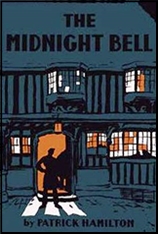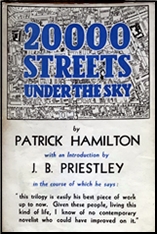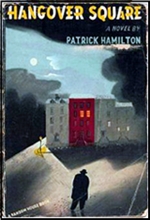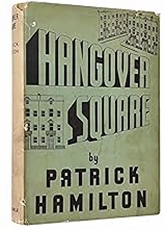Tue 10 Oct 2023

PATRICK HAMILTON – Midnight Bell. Hardcover, UK, 1929. Little Brown, US, hardcover, 1930. Included in the 3-in-1 trilogy Twenty Thousand Streets Under the Sky (Constable, UK, hardcover, 1935); republished by Vintage, 1998.
Fact and fiction. Where’s the line? Even your dreams are drawn from your life. Your life drawn from your dreams. They seep into one another. Like liquor in a cake. Sweet and bitter. As the case may be.
Patrick Hamilton, drawn from his life with little camouflage, pulls a draught, a drought, for the tolling of the Midnight Bell. ’Tis the name of a bar. The bar he tends. His name is Bob.
Bob falls for a young, pretty prostitute. Frail. And fallen. And he could save her. Maybe.
He feels like he’s slumming. Like he’s bound for much greater glories. A great author to be. But he feels for Jenny, the wayward waif. She’s got an innocence that belies her life. Her life is a lie that lays beneath her virtue: an innocence that cannot be spoilt. And innocence and purity that none of her Johns can plunder. That only he can see.
He has saved 80 pounds. By the hardest. And he asks her to go away with him. To flee, with him, this drudgery. ‘The glazed blue eyes of a carefree kleptomaniac.’
And she agrees. My Bob, she says. My Bob, come to save me.

She, thru the tried and true method of exchanging her bearing on every other meeting from warmth to coldness, she succeeds in extracting every last pound from ‘her Bob’. And leaves him flat. Preying on his prayers. Squeezing every last droplet of blood money from his innocence, his adoration, and his love.
She was ‘born to toil but did not toil….for that reason bold, lazy, ruthless, and insensitive: that they were women of the street.’
‘Possibly one of the peculiarly depressing situations in the world is this: to be a waiter who has once had eighty pounds, to have fallen incontinently in love with a blue-eyed young prostitute of twenty-one, to have arranged to meet her at Victoria so as to go away on a holiday with her, to have waited for an hour for her without result, to have decided to get wildly drunk, to have succeeded, to have had every penny of the last of your money stolen….to have been got to bed by the charity of another prostitute….and, finally, to wake up, trembling with cold, in a doss house, at the black bitter hour of half-past five, and slowly divine that all this has occurred.’
‘Were there any lower circles, he wondered, to which he might descent in hell?’
PATRICK HAMILTON – Hangover Square. Constable, UK, hardcover, 1941. Random House, US, hardcover, 1942. Film: TCF, 1945 (scw: Barre Lyndon; dir: John Brahm).
Patrick Hamilton would have his revenge. At least in dreams. In Hangover Square.
Here he calls himself Bone. George Harvey Bone.
Bone is in love. With Netta Longdon. Yet another wayward waif. Warm and cold. With greed.

‘Netta. The tangled net of her hair-the dark net-the brunette. The net in which he was caught-netted. Nettles. The wicked poison-nettles from which had been brewed the potion which was in his blood. Stinging nettles. She stung and wounded him with words from her red mouth. Nets. Fishing-nets. Mermaid’s nets. Bewitchment. Syrens — the unearthly beauty of the sea. Nets. Nest. To nestle. To nestle against her. Rest. Breast. In her net. Netta. You could go on like that for ever-all the way back to London.’
But while George Harvey Bone is ordinarily too soft, too British, to proper and repressed to dole out the punishment Netta deserves for her deceit, there is another George Harvey Bone. For Bone has broken into two. A psychotic break of which his proper personality is unaware. Except for the click of the switch.
‘Snap…Click! — just like that…
‘He was walking along the front at Brighton, in the sombre early dawn, in the deep blue cloudy not-quite-night, and it had happened again…
‘Click!…It was as though his head were a five-shilling Kodak camera, and someone had switched over the little trigger which makes the exposure. He knew the sensation so well, yet he never failed to marvel at its oddity.

‘Like a camera. But instead of an exposure having been made the opposite had happened — an inclosure — a shutting down, a locking in. A moment before his head, his brain, were out in the world, seeing, hearing, sensing objects directly; now they were enclosed behind glass (like Crown jewels, like Victorian wax fruit), behind a film — the film of the camera, perhaps, to continue the photographic analogy-a film behind which all things and people moved eerily, without colour, vivacity or meaning, grimly, puppet-like, without motive or conscious volition of the own…’
In his periods of psychotic trance he moves ineluctably, intractably, towards the single minded purpose that he must kill Netta. Kill her and escape to Maidenhead, pastoral land of his childhood, on a rowboat with his sister, in the warmth of the sun. And braying sheep. At Maidenhead he’ll be safe. But first, he must kill Netta.
So what we see thru the course of the novel is Netta jerking Bone around, yanking his chain when she needs money, insinuating her love, then coldly casting him aside when she gets it. Which only serves to deepen his adoration, his affliction — and his psychotic break.
Midnight Bell is a well-drawn slice of life. Reminiscent of Barfly. But serves best as an aperitif for Hangover Square.
Hangover Square is a terrific novel. One of the best I know. And what elevates the thing to a level with Simenon’s Stain in the Snow and Bataille’s Blue of Noon is its confluence with the rise of fascism in Europe. While George Harvey Bone is losing himself to psychosis, the threat of war is at hand. The climax of Hangover Square coordinates with the German invasion of Poland.
Violent eclipse was coming home. Schindler’s List ends with the quote: ‘Whoever saves one life, saves the world entire.’ For George Harvey Bone, it’s the reverse.
October 10th, 2023 at 7:14 pm
Hamilton’s novels all have that sense of being wrested from some small terrible tragic act observed from too close for moral safety. I suppose if I was going to compare him to anyone it would be in spirit Patricia Highsmith if not style or voice.
Reading Hamilton you always have the sense you just escaped doing something horrible you can’t take back.
A shame there isn’t a second film of HANGOVER SQUARE with the modern setting closer to the action of the novel however entertaining the John Brahm film is.
October 10th, 2023 at 8:28 pm
David,
I agree that it’s a similar universe of the damned we see in Highsmith. However, unlike Highsmith, Hamilton isn’t making up stories like a normal author might. Rather, Hamilton is literally drinking himself to death, chasing women of the night, and losing the chase. It’s more depressing than Highsmith, as it seems more like a diary of the damned. Highsmith, I feel like, is telling us stories. Hamilton is relating his godforsaken life.
October 11th, 2023 at 6:08 am
“Hamilton is literally drinking himself to death, chasing women of the night, and losing the chase.”
Bob – a fictional waiter – is doomed. Hamilton – a writer – is gathering material, however painfully. The changed letter is significant.
It’s a shame Hangover Square the film claims a basis in the novel, as we misjudge it so badly. It’s a strange masterpiece, especially in the way Herrmann’s music is integrated into the plot.
October 11th, 2023 at 7:58 am
Roger,
You are so right. It hadn’t occurred to me until your comment that Bob is literally a ‘waiter’–waiting for Jenny to come to him, to run away with him. And when she fails to come, breaking his heart again and again, he drowns himself in drink.
I don’t know if Hangover Square is a retelling of Midnight Bell from a distance, further dramatized; if it’s based on a later incident of similar ilk; or if the schizoid break of George Harvey Bone is some sort of wish fulfillment of a repressed cuckolded dupe.
It is ironic that while Hamilton (‘Bob’) thinks he is a writer who dreams of running away with Jenny to start some idyllic pastoral life in authorial bliss–in fact Jenny is the muse who breaks him, inspiring the novel for which he is most remembered.